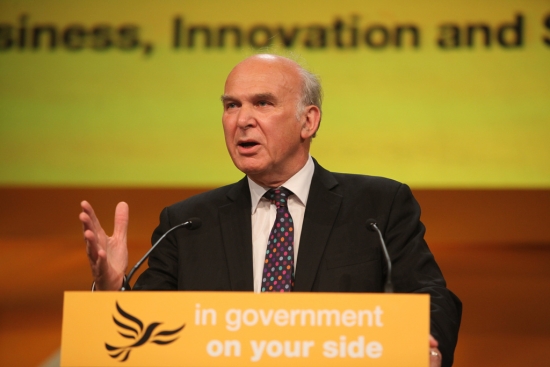Since the banking crisis brought the issue of bad lending to light, banks have become increasingly wary of signing off on loans to small businesses. And while lending has gradually increased in recent months due to governmental pressure on the UK’s largest banking chains, SMEs still find themselves unable to access emergency funds or borrow to fund business growth in many cases.

Vince Cable welcomes the RBS review
In response to significant industry criticism of this treatment of small business owners, the Royal Bank of Scotland (RBS) has revealed plans to instigate an independent review designed to assess how its lending policy can be altered to help struggling small companies.
Former deputy governor of the Bank of England, Sir Andrew Large, and management consultancy expert Oliver Wyman have already been confirmed as leaders in the exercise.
During the review period, the independent team will survey SME customers on their experiences of borrowing from RBS through a dedicated website. They will also take into account the opinions of business groups, the government, regulators and the bank’s own customers when dissecting the RBS decision-making process.
Head of UK corporate banking at RBS, Chris Sullivan, believes the review could highlight ways RBS can assist overall economic recovery.
He says; “Demand for lending remains a challenge, but we want to do more than just wait for demand to materialise.
“We want to play our part in securing the recovery.”
Although RBS announced it had £20 billion put aside for UK SME lending in May, the most recently released figures showed a drop in business net lending to £1.6 billion during the first quarter of this year. This, presumably, is an issue which will be addressed in the review this summer.
Yet while industry experts have at times spoken of their outrage at the fall in lending, given that RBS gained a substantial taxpayer bailout at the start of the recession, it is hardly surprising that the banks remain wary of the free-for-all loan situation which triggered the banking crisis in the first place. With SME administrations remaining fairly high, especially in the retail sector, the risk of a company defaulting on their loan is a very present danger in the current climate.
As a result, RBS is determined that steps will be taken in the review to cement policies for safe and sound lending practices.
Business Secretary Vince Cable voiced his delight at the announcement of the review, which he hopes will force RBS to loosen up its lending policies.
He said; “[Businesses] cannot get money out of that bank because of tough limits they’ve imposed.
“I was told about this £20 billion down the back of the sofa quite a long time ago by Mr Hester, and I couldn’t understand his problem.
“I hope that £20 billion will be put to good use – there are plenty of British companies that could use it.”
Do you think the majority of high street banking chains should ease up on their tough lending restrictions now that the fortunes of the economy are on the up, or should lessons be learned from the banking crisis and caution be the watchword in the banking sector?
Previous Post
Retail Rents Fall but Market is Expected to Recover